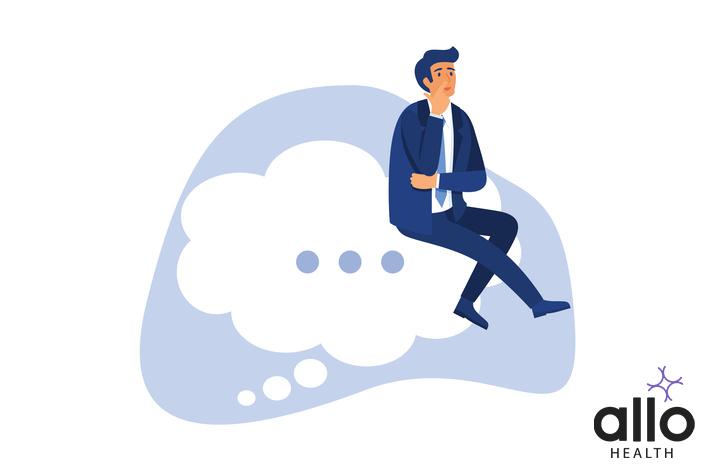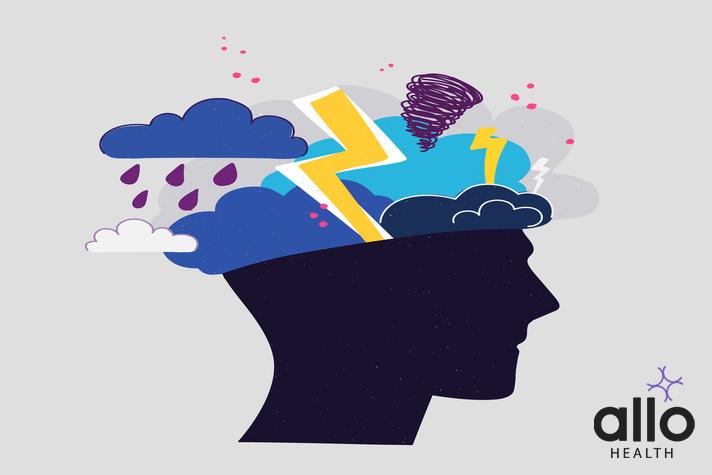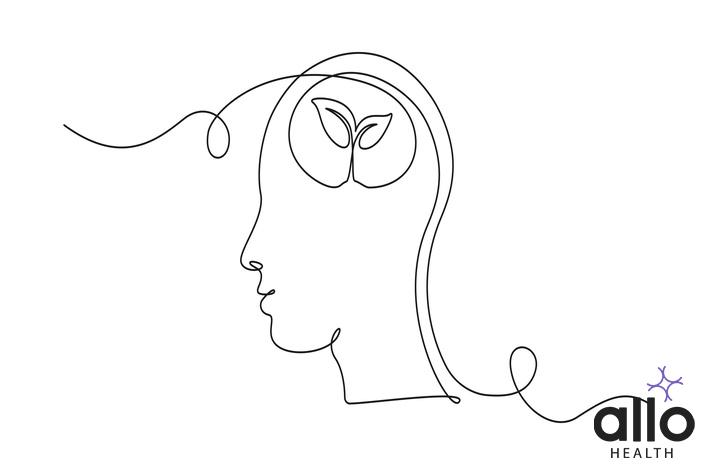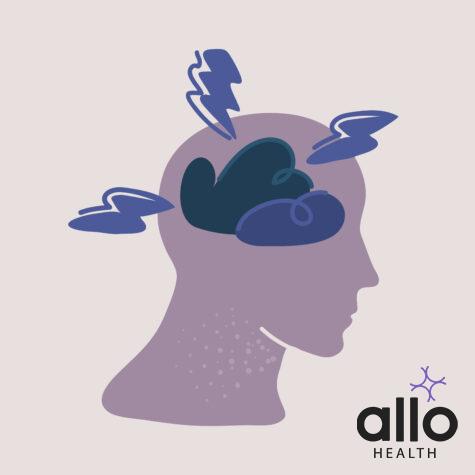Porn Addiction Treatment

Allo Health is dedicated to personalized well-being, offering support and trusted information tailored to individual health goals. The platform emphasizes human-generated content, led by a distinguished medical team of experts, including physicians and sexual health specialists. Their commitment to credibility involves rigorous fact-checking, authoritative research, and continuous updates to ensure accurate, up-to-date information. Allo Health's unique approach goes beyond conventional platforms, providing expert-led insights and a continuous commitment to excellence, with user feedback playing a crucial role in shaping the platform's authoritative voice.

An early career psychiatrist with extensive experience in general adult psychiatry, relationship issues, psychosexual problems & special interest in sexual medicine, disorders with addictive behaviours and Obsessive Compulsive disorders. He is an astute physician with excellent academic record and research experience. He is also a member of World Health Organisation and World Psychiatric Association. His vision and goal for Allo is an inclusive, accessible digital health clinic for psychosexual difficulties.
Why This Was Upated?
Our experts continually monitor the health and wellness space, and we update our articles when new information became available.
Updated on 18 June, 2024
- Article was updated as part of our commitment to diversity, equity, and inclusion.

"The following blog article may discuss medical treatments and interventions. However, it is important to note that the information provided is for general educational purposes only and should not be considered as a substitute for professional medical advice, diagnosis, or treatment. Always seek the guidance of a qualified healthcare professional for personalized medical advice.
Book consultation
Medical treatments are complex and should be tailored to individual circumstances. The information presented in this blog may not be applicable to everyone, as each person's medical condition, history, and needs are unique. Only a qualified healthcare professional can evaluate your specific medical situation, consider relevant factors, and provide appropriate recommendations for diagnosis, treatment options, and monitoring.
It is crucial to note that self-diagnosis, self-medication, or relying solely on the information provided in this blog for treatment decisions can have serious health consequences. "
Compulsive or addictive behaviour is effectively helped through a consultation with an expert such as a psychiatrist or a psychologist. Commonly, individuals try to curb the addiction themselves, they are unable to do so because they don’t understand the cause.It isn’t widely known that there are various ways to treat porn addiction and the ideal way to approach treatment for pornography addiction is to identify the cause behind the compulsive behaviour.
As mentioned above, porn addiction can be due to psychological concerns. The goal of therapy sessions involves identifying the psychological concern and the cause behind it. Systematic treatment will help improve porn addiction symptoms and subsequently help with curbing the addiction.
Besides psychological concerns, therapy will also be able to help with other causative factors such as interpersonal concerns within a relationship, previous or current physical,
mental, or emotional abuse, and formulating a positive understanding of sex.
Pornography Addiction Recovery & Treatment

How to deal with porn addiction is a common question among many, but many are also unaware of the treatment options available for the condition. This could be due to accessibility, stigmas and a general lack of education about the condition. In recent times, there are different ways that porn addiction treatment can be approached. Here are a few ways that porn addiction can be treated after a thorough evaluation from a medical professional:
Cognitive-behavioral therapy (CBT)
This type of therapy aims to change negative thought patterns and behaviors associated with pornography use. It may involve techniques such as journaling, identifying triggers for pornography use, and developing coping strategies to manage cravings.
Cognitive-behavioral therapy (CBT) is a form of psychotherapy that focuses on helping individuals change their negative thoughts and behaviors. It has been found to be effective in treating a variety of mental health conditions, including addiction.
Cognitive-behavioral therapy is an evidence-based treatment approach that has been shown to be effective in helping individuals with porn addiction. It involves identifying and challenging negative thoughts and behaviors that contribute to the addiction, and replacing them with healthy coping mechanisms.
During CBT, individuals with porn addiction work with a therapist to identify the negative thoughts and behaviors that contribute to their addiction. They may also be asked to keep track of their pornography use and the situations in which they use it.
Once these negative thoughts and behaviors have been identified, the therapist will work with the individual to develop strategies to change them. This may involve developing new coping mechanisms to deal with stress or other triggers that lead to pornography use, or learning to reframe negative thoughts about oneself or one’s relationships.
CBT can also involve exposure therapy, in which the individual gradually exposes themselves to pornography in a controlled setting with the support of their therapist. This helps them learn to manage their cravings and reduce their dependence on pornography.
In addition to individual therapy, group therapy can also be helpful for individuals with porn addiction. Group therapy allows individuals to share their experiences and support each other as they work to overcome their addiction.
Group therapy
Group therapy involves participating in therapy sessions with other individuals struggling with similar concerns. This can be helpful in providing support and accountability, as well as learning from the experiences of others.
Couples therapy
Couples therapy for porn addiction is a type of therapy that focuses on helping couples navigate and resolve conflicts related to one partner’s addiction to pornography or compulsive porn viewing. This therapy is typically conducted by a licensed therapist or counselor who is trained in working with couples and addiction concerns.
During couples therapy, both partners will have the opportunity to express their feelings and concerns about the addiction, and the therapist will help them communicate more effectively with each other. The therapist may also provide education about the impact of porn addiction on the brain and offer strategies for coping with and overcoming the addiction.
How can couples therapy or couples counseling help with porn addiction?
Couples therapy can be an effective tool for helping couples work through the challenges of porn addiction and repair their relationship. Some of the ways that couples therapy can help include:
Improving communication
One of the key benefits of couples therapy is that it provides a safe and neutral space for both partners to communicate openly and honestly about their feelings and concerns. This can help couples better understand each other’s perspective and improve their communication skills.
Providing education
A therapist can provide education about the impact of porn addiction on the brain and the relationship, which can help both partners better understand the addiction and how to cope with it.
Offering support
Therapy can provide both partners with a supportive environment where they can discuss their feelings and receive guidance and support from the therapist.
Developing coping strategies
A therapist can help couples develop coping strategies and techniques for managing and overcoming the addiction, such as setting boundaries and finding healthy ways to cope with stress and triggers.
Healing the relationship
Finally, couples therapy can help couples heal the damage that the addiction has caused in their relationship and work towards rebuilding trust and intimacy.
12-step programs
12-step programs, such as Sex Addicts Anonymous (SAA) and Sex and Love Addicts Anonymous (SLAA), are modeled after Alcoholics Anonymous and provide a structured program for recovery from addiction. These programs involve attending meetings, finding a sponsor, and working through the 12 steps with the goal of achieving long-term recovery.
Medications
There are several medications for pornography addiction that have been found to be effective in the treatment of porn addiction. These medications work by altering brain chemistry and can help reduce cravings for pornography and improve impulse control. Some of the most commonly used medications for porn addiction include:
Opiate antagonists
This medication is typically used to treat alcohol and opioid addiction, but it has also been found to be effective in the treatment of porn addiction. Naltrexone works by blocking the pleasure centers in the brain that are activated by pornography, reducing the desire to view it.
Antidepressants
Selective serotonin reuptake inhibitors (SSRIs) and other types of antidepressants can help reduce cravings for pornography and improve impulse control. These medications work by increasing the levels of serotonin, a neurotransmitter that is involved in mood regulation and impulse control.
Mood stabilizers
Medications such as lithium and valproic acid can help reduce impulsivity and improve mood in individuals with porn addiction. These medications are often used to treat bipolar disorder and can be effective in reducing the desire to view pornography.
Medication alone is not a sufficient treatment for porn addiction. A comprehensive treatment plan should also include therapy, support groups, and other forms of support. A mental health professional can help you develop a treatment plan that is tailored to your specific needs and goals.
Treating Mental Health Conditions

Bipolar Disorder
Bipolar disorder, also known as manic-depressive disorder, is a mental health condition that causes extreme shifts in mood, energy, and activity levels. People with bipolar disorder experience periods of elevated or irritable mood (manic episodes) and periods of depression. These mood changes can be severe and can interfere with an individual’s daily life.
Porn addiction, on the other hand, is a type of behavioral addiction characterized by an excessive or compulsive use of pornography. It can lead to negative consequences such as concerns with relationships, work, and financial stability.
Not everyone with bipolar disorder will develop a porn addiction, and vice versa. Research has shown that individuals with bipolar disorder may be more vulnerable to developing an addiction, including a porn addiction. This may be due to the changes in mood and impulse control that can occur during manic or depressive episodes.
Treatment for bipolar disorder typically involves a combination of medication and therapy. Antidepressant and mood stabilizing medications can help to regulate mood and prevent extreme shifts in mood. Therapy, such as cognitive-behavioral therapy (CBT) and dialectical behavior therapy (DBT), can help individuals learn coping skills and strategies to manage their mood and improve their overall functioning.
Treatment for porn addiction may involve a similar approach, with the addition of support groups and other resources to help individuals overcome their addiction. Therapy, such as CBT, can help individuals identify and change negative thought patterns and behaviors related to their addiction.
Depressive Disorders
Depression, also known as major depressive disorder, is a mental health condition characterized by persistent feelings of sadness, hopelessness, and a lack of interest in activities. It can interfere with an individual’s daily life and may cause physical health symptoms such as changes in appetite and sleep patterns.
Porn addiction, on the other hand, is a type of behavioral addiction characterized by an excessive or compulsive use of pornography. It can lead to negative consequences such as concerns with relationships, work, and financial stability.
Not everyone with depression will develop a porn addiction, and vice versa. Research has shown that individuals with depression may be more vulnerable to developing an addiction, including a porn addiction. This may be due to the changes in mood and pleasure seeking that can occur as a result of depression.
Treatment for depression typically involves a combination of medication and therapy. Antidepressant medications can help to improve mood and alleviate symptoms of depression. Therapy, such as cognitive-behavioral therapy (CBT) and dialectical behavior therapy (DBT), can help individuals identify and change negative thought patterns and behaviors that contribute to their depression.
Anxiety Disorders: Obsessive Compulsive Disorder
Obsessive-compulsive disorder (OCD) is a common mental health condition that can cause unwanted thoughts, feelings, and behaviors. One potential manifestation of OCD is an addiction to pornography. While pornography can be a normal and healthy part of an adult’s life, an addiction to pornography can interfere with daily functioning and relationships, and may be a symptom of underlying OCD.
If you or someone you know is struggling with an OCD-related addiction to pornography, there are effective treatments available that can help. Here are some tips for treating OCD causing porn addiction:
(1) Seek professional help: The first step in treating any addiction is to seek help from a qualified mental health professional. They can help diagnose and treat the underlying OCD, as well as address the addiction itself.
(2) Cognitive-behavioral therapy (CBT): CBT is a type of therapy that helps individuals identify and change negative thought patterns and behaviors. It can be an effective treatment for OCD and addiction, as it helps individuals learn new coping skills and develop healthy habits.
(3) Consider medication: In some cases, medication can be an effective treatment for OCD and addiction. Antidepressants and antipsychotics are commonly prescribed to treat OCD, and medication can also help reduce cravings and ease withdrawal symptoms associated with addiction.
(4) Find support: Recovery from addiction is often a long and challenging process. It can be helpful to find support from friends, family, and support groups, such as 12-step programs like Sex Addicts Anonymous.
(5) Practice self-care: Prioritize self-care and manage stress during the recovery process. This can include things like getting enough sleep, exercising, eating a healthy diet, and finding healthy ways to relax and unwind.
Holistic approaches
Some individuals may find holistic approaches, such as mindfulness meditation or yoga, helpful in managing their addiction. These approaches can help reduce stress and improve overall well-being, which may in turn help reduce the need to view pornography.
Meditation & Yoga For Porn Addiction
Meditation is a practice that involves focusing the mind on a particular object, thought, or activity to train attention and awareness. When it comes to an addiction to porn, meditation can help individuals learn to control their thoughts and emotions, which can be particularly useful in managing the cravings and triggers that often lead to relapse.
One form of meditation that can be particularly helpful in overcoming porn addiction is mindfulness meditation. This involves bringing one’s full attention to the present moment, without judgment, and accepting whatever thoughts and feelings arise. By learning to be present and aware of one’s thoughts and emotions, individuals can gain a greater sense of control over them and be better equipped to make healthier choices.
Yoga is another practice that can be beneficial for those struggling with porn addiction. In addition to the physical health benefits of increased flexibility and strength, yoga can also help to improve mental and emotional well-being. The combination of physical movements and controlled breathing can help to reduce stress and improve self-regulation, both of which can be important in overcoming porn addiction.
In addition, the mindfulness aspect of yoga – paying attention to the present moment and one’s body – can help individuals become more aware of their thoughts and emotions and learn to manage them in a healthy way. This can be particularly helpful in managing the cravings and triggers that often lead to relapse in those struggling with porn addiction.
While meditation and yoga are not a magic cure for porn addiction, they can be powerful tools in the recovery process. By incorporating these practices into a comprehensive recovery plan, individuals can learn to manage their thoughts and emotions, reduce stress, and make healthier choices, all of which can help to support a successful recovery from porn addiction.

Treating Substance or Drug Abuse Disorders
Porn addiction can lead to a range of negative consequences, including abuse of addictive substances. When someone becomes addicted to pornography, they may turn to drugs or alcohol as a coping mechanism to deal with the stress and shame that often accompanies this type of addiction. Additionally, the brain’s reward pathways can become hijacked by the constant release of dopamine that occurs when viewing pornography, leading to a need for increased stimulation and potentially leading to substance abuse or substance addiction.
Seek professional help
The first step towards overcoming substance abuse caused by porn addiction is to seek help from a qualified mental health professional. A therapist or counselor can help you address the underlying concerns that may be contributing to your addiction and provide you with the support you need to make positive changes in your life.
Learn about the dangers of porn addiction
Understanding the negative consequences of porn addiction can help motivate you to make changes in your behavior. Educate yourself on the potential harm that porn addiction can cause, including the risk of developing an addiction to drugs or alcohol as a way to cope with the feelings of shame and guilt that often accompany this type of addiction.
Consider joining a support group
There are many support groups available for individuals struggling with porn addiction and substance abuse. These groups can provide a safe and supportive environment where you can share your experiences and receive encouragement and guidance from others who have faced similar challenges.
Make healthy lifestyle change
In addition to seeking professional help and joining a support group, making healthy lifestyle changes can also be an important step in overcoming substance abuse caused by porn addiction. This may include eating a healthy diet, getting regular exercise, and finding healthy ways to cope with stress and negative emotions.
Recovering from substance abuse caused by porn addiction is a challenging journey, but it is one that is possible with the right help and support.
Treating Sexual Dysfunctions
Porn addiction is a form of behavioral addiction that can have a number of negative consequences on an individual’s life, including sexual disorders. These disorders can include erectile dysfunction, difficulty orgasming, and decreased libido. They can also lead to concerns in relationships and a lack of satisfaction with sexual experiences. If you are struggling with sexual disorders caused by porn addiction, there are several approaches you can take to get help and start on the road to recovery.
There is no one-size-fits-all approach to treating porn addiction, and the most effective treatment will depend on the individual’s unique needs and circumstances. It may take some trial and error to find the right treatment approach, and it’s important to be patient and persistent in the recovery process.
Watching porn or explicit material isn’t a bad thing, nor should it be associated with any shame. The negative impacts or effects of porn addiction can impact your sexual, physical and mental health.
Contacting a professional will help ease the guilt and embarrassment associated with the addiction. But most importantly, you will be able to curb the addiction in a much healthier way, to make sure a relapse does not happen. The effective treatment for compulsions and addictions associated with sexual dysfunctions is possible. It’s a myth that a cure doesn’t exist – the experts can help you overcome your obstacles and help you lead a better quality of life.
Porn Addiction Counseling
Porn addiction counseling is a form of psychological therapy designed to help individuals who are struggling with an excessive and compulsive consumption of pornography. It aims to address the negative impact of this behavior on their lives, relationships, and overall well-being. Porn addiction, also known as compulsive sexual behavior disorder or problematic sexual behavior, involves an inability to control one’s consumption of sexual material, leading to distress and impairment in various areas of life.
Here’s an overview of what porn addiction counseling entails:
- Assessment and Diagnosis: The first step in porn addiction counseling is a thorough assessment to determine whether the individual’s behavior qualifies as an addiction. A trained counselor or therapist will conduct interviews and may use standardized questionnaires to evaluate the severity of the addiction and its impact on the individual’s life.
- Individualized Treatment Plan: Based on the assessment, a personalized treatment plan is developed. This plan takes into consideration the individual’s unique needs, circumstances, and goals. It outlines the specific strategies and techniques that will be employed during the counseling process.
- Psychoeducation: Clients are educated about the nature of addiction, the brain’s reward system, and the mechanisms behind compulsive behavior. Understanding the science behind addiction can help clients gain insight into their own behaviors and motivations.
- Cognitive-Behavioral Therapy (CBT): CBT is a commonly used therapeutic approach in porn addiction counseling. It helps individuals identify and change negative thought patterns and behaviors associated with their addiction. Clients learn to challenge distorted beliefs about pornography and develop healthier coping mechanisms.
- Mindfulness and Self-Awareness: Mindfulness techniques are often incorporated to help clients become more aware of their triggers, emotions, and impulses. Mindfulness encourages individuals to observe their thoughts and feelings without judgment, which can be helpful in managing urges.
- Relapse Prevention: Clients learn strategies to prevent relapses and manage cravings. They develop coping skills to deal with high-risk situations and stressors that may lead to a return to addictive behavior.
- Communication and Relationship Skills: Porn addiction can strain relationships. Counseling may address communication skills and help clients rebuild trust and intimacy in their relationships.
- Group Therapy: Group therapy sessions may be included, allowing individuals to share their experiences, receive support from peers facing similar challenges, and learn from others’ strategies for recovery.
- Family Involvement: In some cases, family members may be involved in the counseling process to provide support and understand the nature of addiction.
- Progress Monitoring: Throughout the counseling process, progress is tracked, and the treatment plan may be adjusted based on the individual’s response to therapy.
- Aftercare and Long-Term Support: After the initial counseling sessions, individuals may be encouraged to continue with regular therapy sessions or participate in support groups. Maintenance of the skills learned during counseling is crucial for long-term recovery.
Porn addiction counseling is typically provided by licensed mental health professionals, such as counselors, psychologists, or social workers, who have experience in treating addictive behaviors. The overall goal of this counseling is to help individuals regain control over their behavior, improve their overall quality of life, and establish healthier patterns of relating to sexuality and intimacy.
Frequently Asked Questions
(1) How to control porn addiction or how to overcome porn addiction?
Controlling or overcoming porn addiction can be a challenging process, but it is definitely possible with the right strategies and support. Here are some detailed steps to help you in your journey towards overcoming porn addiction:
- Acknowledge the concern: Recognize and accept that you have a porn addiction. Admitting the concern is the first step towards recovery.
- Educate yourself: Learn about the negative effects of porn addiction on your mental, emotional, and physical well-being. Understanding the science behind addiction can help you grasp the seriousness of the concern.
- Set clear goals: Define your reasons for wanting to overcome porn addiction. Establish specific, measurable, achievable, relevant, and time-bound (SMART) goals to keep yourself focused and motivated.
- Create a support system: Seek support from understanding friends, family members, or professionals who can provide guidance, encouragement, and accountability throughout your recovery journey.
- Identify triggers and develop coping strategies: Recognize the situations, emotions, or thoughts that trigger your porn use. Develop healthier coping strategies such as exercise, mindfulness, hobbies, or engaging in social activities to divert your attention and manage cravings.
- Practice self-care: Prioritize self-care activities that promote physical and emotional well-being. This may include regular exercise, proper nutrition, sufficient sleep, and engaging in activities you enjoy.
- Utilize technology tools: Use website blockers or content filters to limit your access to pornography. There are numerous apps and software available that can help you create a safer online environment.
- Seek professional help: Consider working with a therapist or counselor who specializes in addiction and can provide personalized guidance and therapy techniques tailored to your specific needs.
- Engage in healthier relationships and activities: Build a support network of individuals who share your values and support your recovery goals. Engaging in fulfilling activities, hobbies, or pursuing new interests can help fill the void left by porn addiction.
- Practice self-reflection and accountability: Regularly assess your progress, identify areas for improvement, and hold yourself accountable for your actions. Journaling can be a helpful tool for self-reflection.
- Stay committed and patient: Overcoming porn addiction takes time and effort. Stay committed to your recovery, even if you experience setbacks or relapses. Patience and self-compassion are key to long-term success.
(2) How long does porn addiction treatment typically take?
The duration of porn addiction treatment varies depending on individual factors, including the severity of the addiction and the individual’s commitment to recovery. Treatment can range from a few months to a year or more. Recovery is a lifelong process, and ongoing support may be necessary even after formal treatment ends.
(3) Can porn addiction be treated successfully?
Yes, porn addiction can be treated successfully. With the right combination of therapeutic interventions, support systems, and individual commitment, individuals can overcome their addiction and achieve long-term recovery. Recovery requires effort and dedication, and relapses may occur. A comprehensive treatment plan, along with ongoing support, can significantly increase the chances of successful recovery.
(4) Where can I find help for porn addiction treatment?
There are various resources available for individuals seeking help for porn addiction treatment. Here are some options:
- Mental health professionals: Seek out licensed therapists or counselors who specialize in sex addiction or compulsive behaviors.
- Treatment centers: Look for residential or outpatient treatment centers that offer programs specifically tailored to porn addiction.
- Support groups: Join local or online support groups dedicated to helping individuals with porn addiction.
- Online resources: Many websites provide information, self-help tools, and online therapy options for individuals seeking porn addiction treatment.
(5) Can self-help resources be effective in overcoming porn addiction?
Self-help resources, such as books, online forums, and educational materials, can be effective tools in overcoming porn addiction. They provide information, guidance, and practical strategies to help individuals understand their addiction and develop healthier habits. While self-help resources can be valuable, supplement them with professional support if needed.
(6) Are there medications available for treating porn addiction?
Currently, there are no specific medications approved for the treatment of porn addiction. In some cases, healthcare professionals may prescribe medications to manage underlying mental health conditions, such as anxiety or depression, that often co-occur with addiction. These medications can help address symptoms that may contribute to porn addiction but should be used in conjunction with therapy and other treatment approaches.
(7) What role does willpower play in overcoming porn addiction?
Willpower plays a significant role in overcoming porn addiction. It is the individual’s determination and commitment to change that drives their recovery efforts.Willpower alone may not be sufficient to overcome addiction. Seeking professional help, building a support system, and utilizing effective coping strategies are also crucial components of successful recovery.
(8) Can a relapse occur during the recovery process?
Yes, relapses can occur during the recovery process. Overcoming addiction is a journey that involves ups and downs. A relapse does not signify failure but rather highlights the challenges and complexities of addiction recovery. It is important to view relapse as an opportunity to learn and grow, re-evaluate strategies, and seek additional support if necessary. With continued effort and support, individuals can get back on track and continue their path to recovery.











































